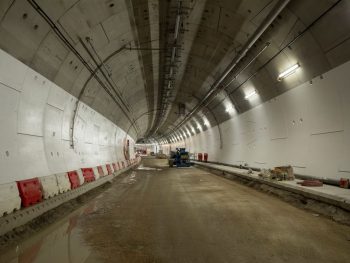A consultation setting out plans to charge tolls for the Silvertown and Blackwall Tunnels is now underway by Transport for London (TfL).

The eight-week consultation sets out plans for user charges, concessions and discounts once the new Silvertown Tunnel opens in spring 2025.
Charges will be replicated across the Blackwall Tunnel, which has been free to use since it opened in 1897, to ensure traffic levels there don’t rise.
The consultation sets out plans to levy charges between 06:00 and 22:00, seven days a week. At peak times (from 06:00 to 10:00 and 16:00 to 19:00 Monday to Friday), cars and small vans will pay £4, with a £2.50 charge for motorbikes and £6.50 for large vans. This drops to £2.50 for large vans and £1.50 for cars, motorbikes and small vans registered for TfL AutoPay and travelling at off-peak times. HGV charges stand at £10 peak and £5 off-peak, when paying via AutoPay.
TfL has said the new Silvertown Tunnel, first proposed in 2012, will help reduce congestion and deliver faster, more reliable journeys in east London, including new public transport and cycle connections, while improving air quality around Blackwall Tunnel.
It added that the tunnel user charges, first proposed in 2012, were required as part of the development consent for the new tunnel and would manage traffic and pay back construction costs.
Christina Calderato, director of strategy at TfL, said: “Without introducing tunnel user charges for the Silvertown and Blackwall tunnels, there would likely be high levels of traffic and congestion, which would lead to detrimental air quality impacts, as well as longer journey times.
“This proposed package of supporting measures aims to ensure the scheme is green and fair for Londoners and businesses. These measures will ensure that the new tunnel delivers on its objectives of reducing congestion and providing resilience at the Blackwall Tunnel, while ensuring we support local residents on low income, small businesses, sole traders and local charities.”
The Clean Cities campaign group said the Mayor’s package of measures to support both individuals and businesses was comprehensive but missing action to back electric vehicle users.
Oliver Lord, head of strategy & UK at Clean Cities, commented: “The glaring omission is on increasing support businesses adopting cleaner electric vans, especially given this tunnel has been primarily built to support freight traffic. How can small businesses be expected to switch to electric vehicles when they then must incur yet another cost? The impact of a diesel and electric van are not the same so they should not be treated in the same way.”
He added: “The opening next year should be coupled with a visionary approach to restructure road capacity elsewhere and I would begin by putting forward a proposal for Tower Bridge, handing back more of this iconic landmark to people instead of polluting motor vehicles.”
Green Party London Assembly Member Caroline Russell said that filling London’s streets with more cars via the Silvertown Tunnel was “not the answer” if the Mayor truly wants London to achieve net zero carbon by 2030.
“The tunnel is creating more road capacity and will simply lead to traffic jams and more pollution. I expect Londoners will respond to the consultation with creative ideas for repurposing the tunnel prioritising people walking and cycling and travelling on public transport.
“The construction contract was always going to mean bringing in tolling on Blackwall tunnel – as well as Silvertown – so the consultation should not be a surprise, but I hope Londoners use it to tell the Mayor they want a fair charging system, rather than this piecemeal approach.”
And Hirra Khan Adeogun, co-director of climate charity Possible, said the last thing that London needed was “another artery of traffic causing more congestion while pumping out pollution”.
She added: “Whatever happens, this consultation must listen to the overwhelming majority of residents in the boroughs affected who do not own a car and ensure the tolling system funds greener ways of getting around.”
The TfL consultation on charge levels, including discounts and exemptions, will run until 3 September 2024. More details are here.

